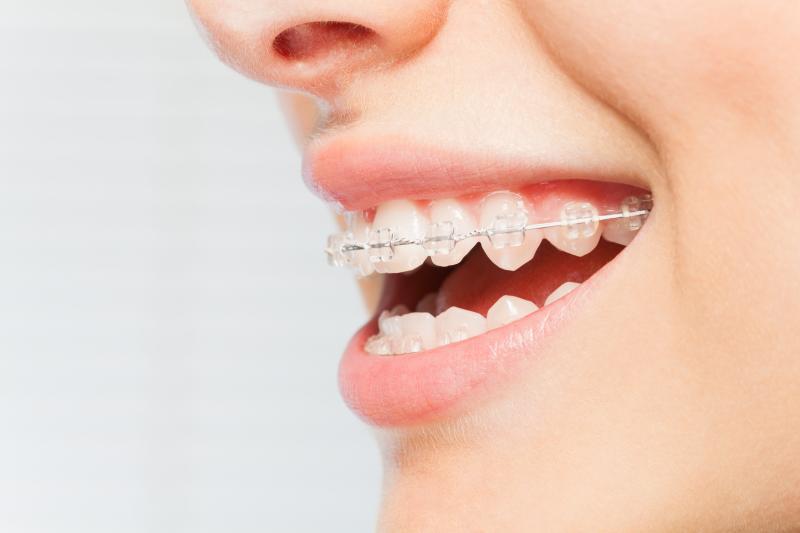Pros And Cons Of Ceramic Braces

Everyone wants straight teeth that function without pain or discomfort. Having braces is one of the most effective ways to correct any issues that the teeth have naturally developed. However, actually getting them can be scary, as you’ll often have to use them for many months. There are more options available now then there were twenty years ago, from metal braces to clear aligners, so it’s much easier to find one that you’re not so uncomfortable with.
When asked, over 50% of people said they felt self-conscious about their teeth, and it's estimated that around 4 million have braces at any one time in the United States. Ceramic braces are one of the most popular options to fix crooked smiles and severe dental issues. (1) (2)
What are ceramic braces?
Ceramic braces, also referred to as invisible braces, are very similar to metal ones. The main difference is that a ceramic base is used, which is more tooth-colored and doesn’t stand out as much as metal. A clear arch bracket and wire is also used to give the impression that the person isn't wearing braces. This may give them more confidence, as people won’t stare or notice their teeth. If you're eager to learn more, this amazing guide about invisible braces is a great source of information.
The actual functionality of ceramic braces is the same as the metal kind, because they use the same elements. However, they may take longer to fix any issues, as there’s usually more friction. Because the functionality is the same as with metal braces, they can treat the same issues, such as a severe overbite. (3)
Who can have ceramic braces and why are they needed?
The ceramic option is available to anyone who needs to have braces; they’re especially great for people who need braces later in life, and don’t want to draw attention to it.
Some people need braces to correct teeth that have grown into a wrong position, or when their mouth is overcrowded. These issues can lead to difficulty in cleaning, which in turn can lead to serious issues such as tooth decay and gum disease. It’s best to have these issues fixed when people are young, and their teeth haven’t finished moving. However, it is possible for teeth to be fixed when people are adults as well. This can help to keep people from needing major oral surgery, and often works out to be cheaper in the long run. To find out whether or not you need braces, you should make an appointment with an orthodontist, such as Braces Haven. (4)

What are the pros and cons of ceramic braces?
The pros
- Less visible than metal braces: they’re the same color as teeth, so they’re not visible from a distance, and are more difficult to see than metal braces.
- Effective: they’re allegedly just as effective as metal braces at fixing severe dental issues, such as overcrowding. They may even be more effective than clear aligners, as the latter are often only able to fix minor problems, and don’t tend to more severe ones.
- Comfortable: some believe that ceramic braces cause less irritation in the mouth compared to metal. This could be a major pro, considering they’ll be worn for months or maybe even years.
- Don’t interfere with image testing: studies show that they have low image noise with regards to image testing, such as x-rays. (5)
The cons
- Cost more: ceramic braces can cost more than metal, because the materials are more expensive and may be needed for longer.
- Move teeth slower than metal braces: they’re more fragile than metal braces, and because of this, they may need multiple adjustments to achieve the same outcome that metal braces might achieve in one.
- May stain: while the bracket doesn’t stain easily, the elastic ties can that hold the brackets to the wire can. This may cause the teeth to look discolored and more noticeable, but can easily be avoided if the teeth and braces are cleaned properly, and certain foods are restricted.
- More maintenance: this is because the elastic is more likely to stain, and the material is less durable than metal. It may mean more cleaning, and more trips to the orthodontist.
- Can cause gum sensitivity: the brackets are larger than metal braces, which can make it more difficult to clean around the tooth and gum. This can lead to the gums being sensitive and aching. (6)
Summing up
There are many reasons why people need to have braces, and it’s important to make sure that they’re the right braces for them. Ceramic braces have some major pros, such as their lack of visibility and increased comfort. However, there are also some cons, such as the cost and time frame, that must be taken into consideration. Make sure to refer back to the information provided and to inform yourself fully before making any decisions.
More to Read:
Previous Posts:





